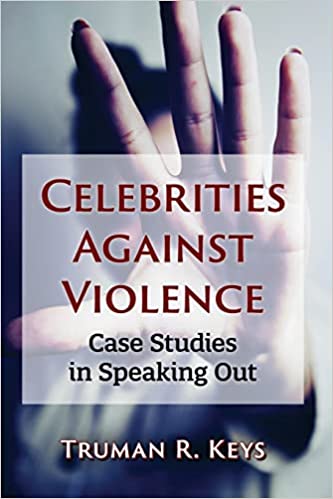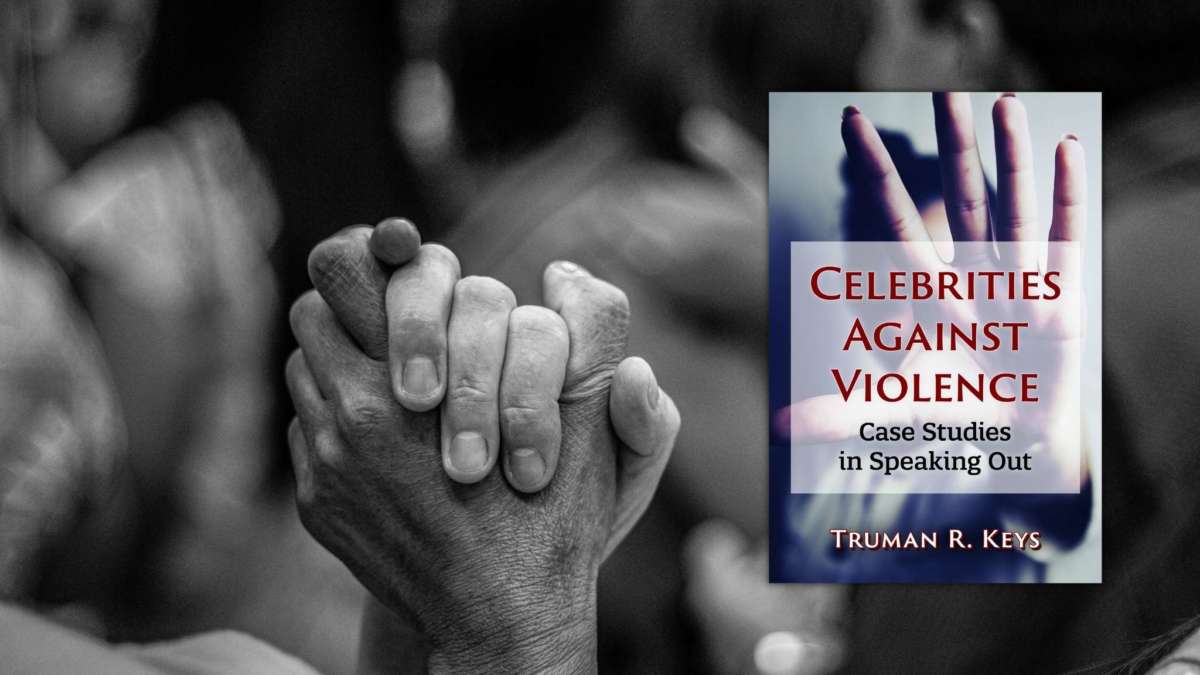Celebrities Against Violence: Case Studies in Speaking Out by Truman R. Keys
What's It About?
Nothing gets the word out faster than a celebrity talking about it. Or, as a new book states, “A celebrity’s public image can be a powerful tool.” All the better to combat the national health issue of violence of all kinds, from domestic to suicide.Celebrities Against Violence: Case Studies in Speaking Out by Truman R. Keys is a scholarly look at what makes celebrities such powerful spokespeople. Keys notes that their fame makes it easy for people to relate, just as we might listen to a friend’s opinion or experiences. Celebrities also can “plainspeak” complex topics, he writes.
Speaking plainly, Angelina Jolie recently addressed the U.S. Senate, urging its members to renew the Violence Against Women Act, saying “When there is silence from a Congress too busy to renew the Violence Against Women Act for a decade, it reinforces that sense of worthlessness. You think, ‘I guess my abuser is right. I guess I’m not worth very much.’ That’s why passing this law is one of the most important votes U.S. senators will cast this year.” The act awaits passage by the Senate.
THE TALES ARE RELATABLE TO EVERYONE
Professor Keys has taught the subject of his book in the department of communication and media arts at Western Connecticut State University. Readers expecting a People magazine-style of lurid details may be disappointed but will come to understand a celebrity’s power when they take a stand for a cause.
“The book is more than a textbook,” Keys says. “The tales are relatable to everyone. Its scope extends beyond the ivory tower to victims, survivors, bystanders and professionals in fields from public affairs to public health to law enforcement, who desperately want to know how to stop the violence pandemic.”
Keys lists the following as the most successful celebrity campaigns against violence, as detailed in his book:
- After her boyfriend beat her, Rihanna’s platform for victims of domestic violence shifted “her public identity from victim to survivor to advocate.”
- Jennifer Hudson’s mother, brother and seven-year-old nephew were killed by her estranged brother-in-law, leading her to speak out against gun violence.
- Ashley Judd spoke out about Harvey Weinstein’s abuse of power and strengthened the #MeToo movement.
- After a friend was stabbed to death, Chance the Rapper “used music as an outlet to express himself and address the hardships of his hometown,” helping to stop gun violence in Chicago for 42 hours.
- After their sister was murdered in a drive-by shooting in their hometown of Compton, California, Venus and Serena Williams established a resource center to empower victims of gang violence.
- Actor Anthony Edwards (Dr. Mark Green on NBC’s “ER”) spoke out about being sexually abused as a teenager, encouraging others to also do so.
- Selena Gomez, Demi Lovato and Zendaya all took stands against cyberbullying after brutal comments from their “fans.”
The World Health Organization reports that someone dies from suicide every 40 seconds. We may not personally know anyone, but we remember celebrities who kill themselves. On the day Robin Williams took his life in 2014, the National Suicide Prevention Lifeline received a record number of 7,375 calls.
A FASCINATING TAKE ON WHAT FAME CAN ACHIEVE
Keys has personal motivations for writing this book. “My earliest experience with violence was when my childhood best friend Dwayne, as an adolescent boy, was accidentally shot during a drive-by shooting. I will never forget him retelling what it felt like to have a bullet pierce his flesh, the burning sensation he felt, and his progression from bystander to victim to survivor during his teenage years.”
He adds: “I believe everyone has personally experienced violence or knows someone who experienced violence and lived to tell their story. I believe violence transcends the differences we have with one another; it is universal, and we can relate to being a victim, a survivor, a bystander, a perpetrator, or sometimes more than one of these identities in our lifetime.”
Read his book for the details of celebrities affected by violence, or read it for ideas on how to harness the power of celebrities. It’s a fascinating take on what fame can achieve for the good of all.





